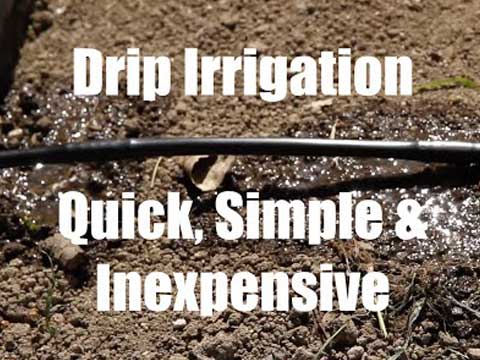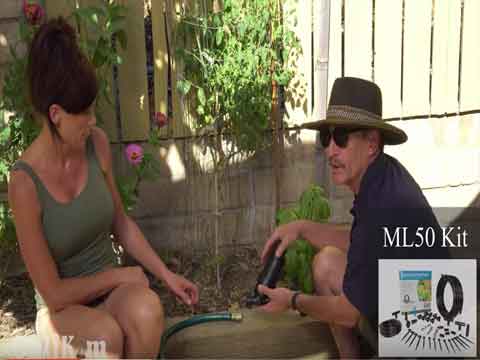ML50 Raised Bed Drip Kit
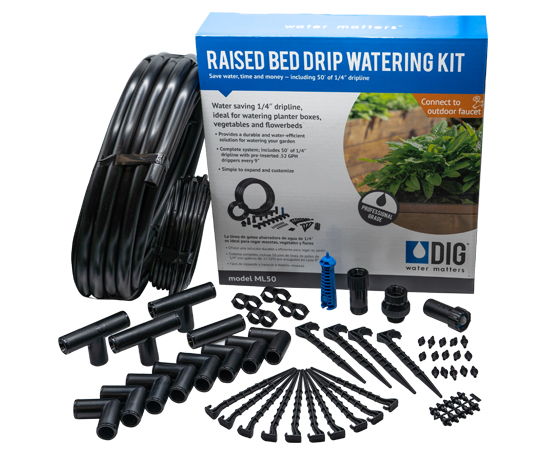

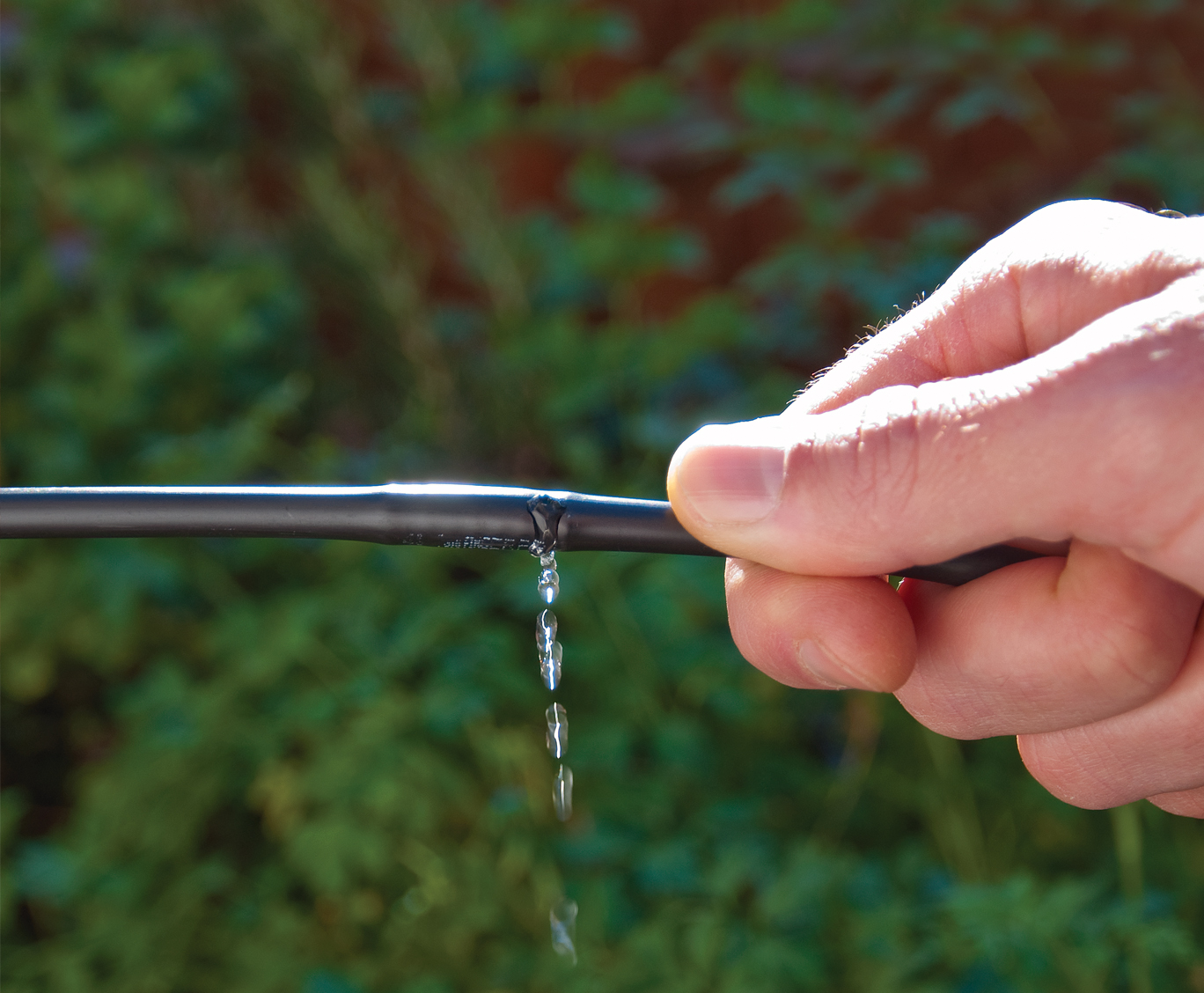
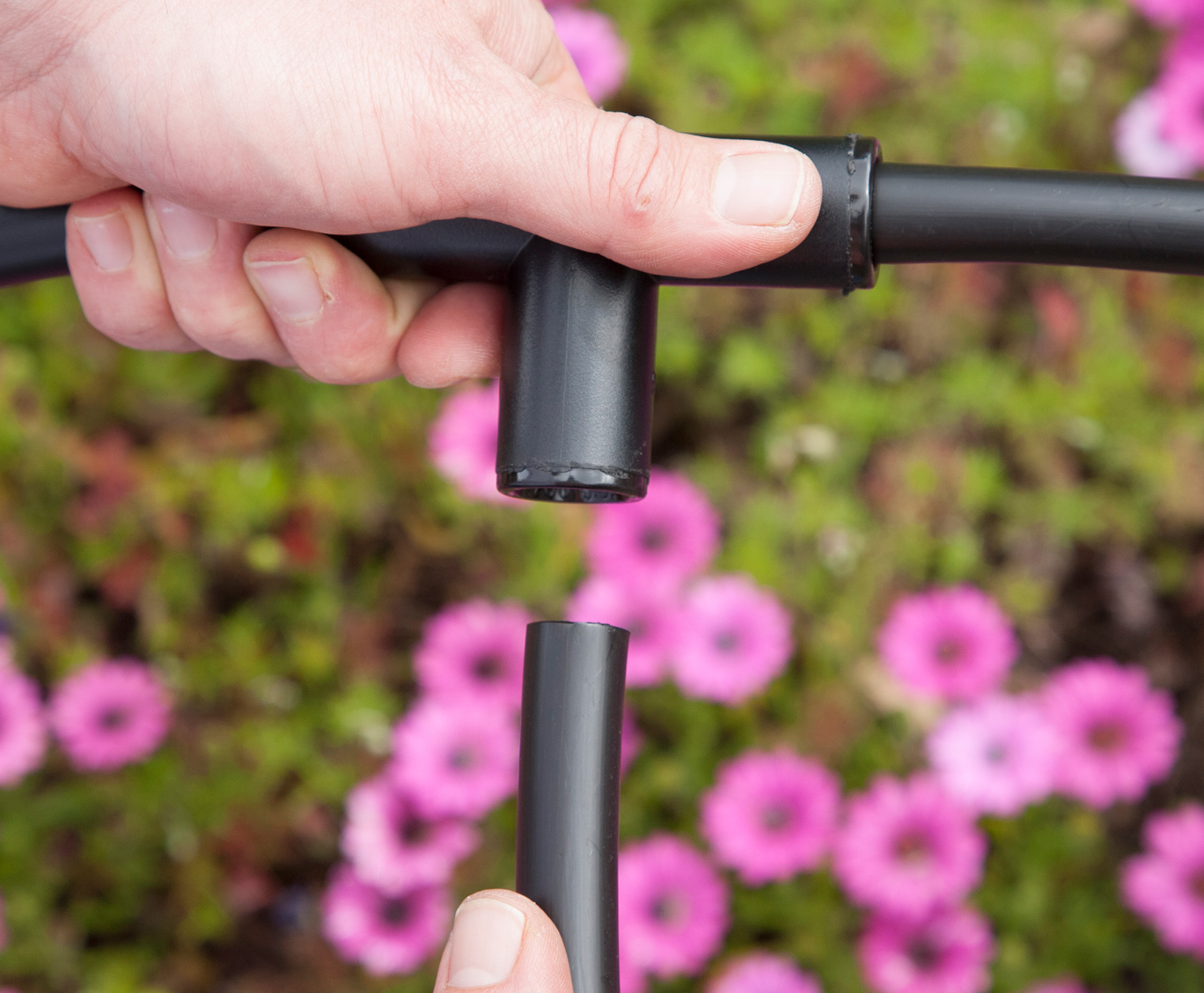
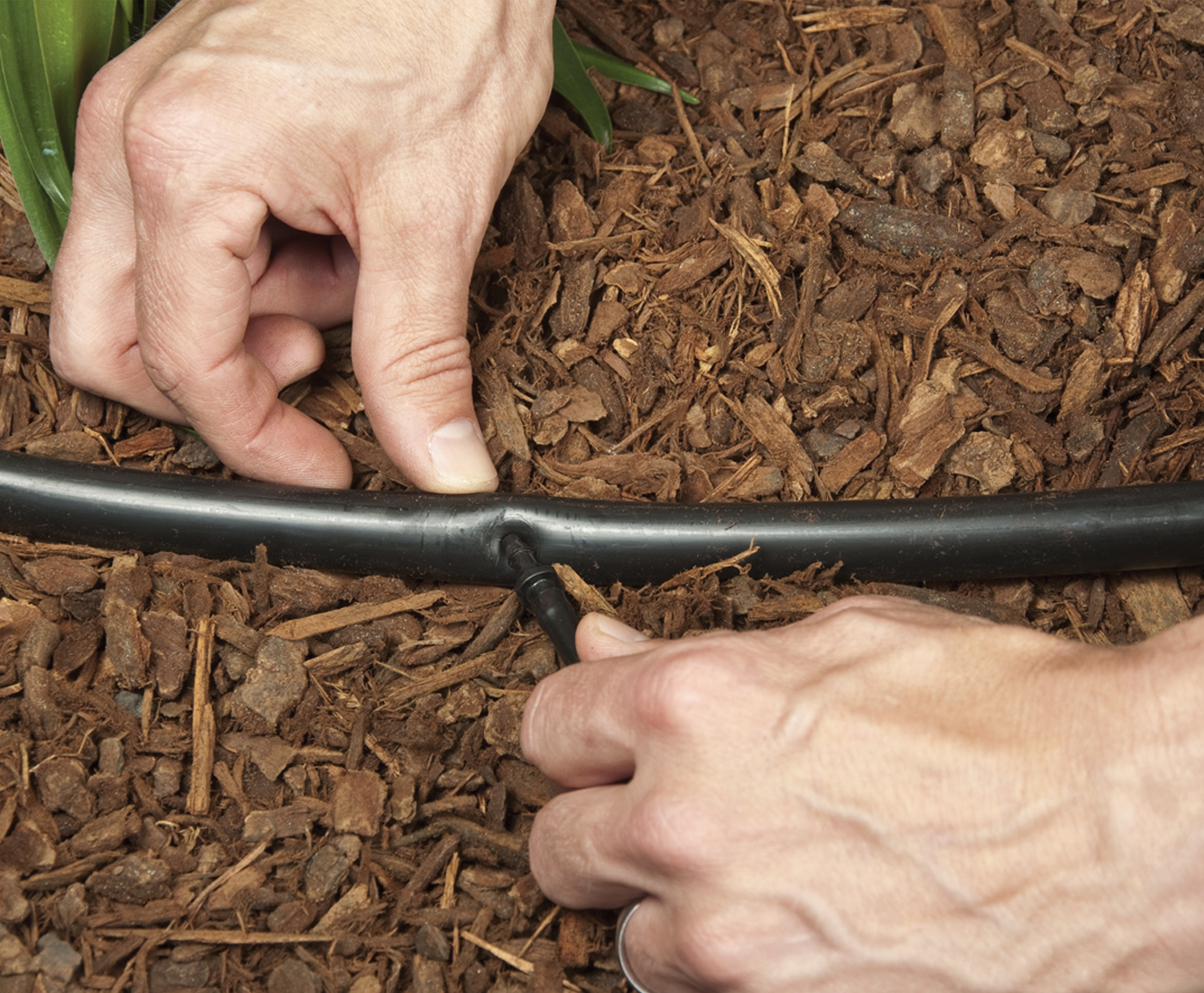
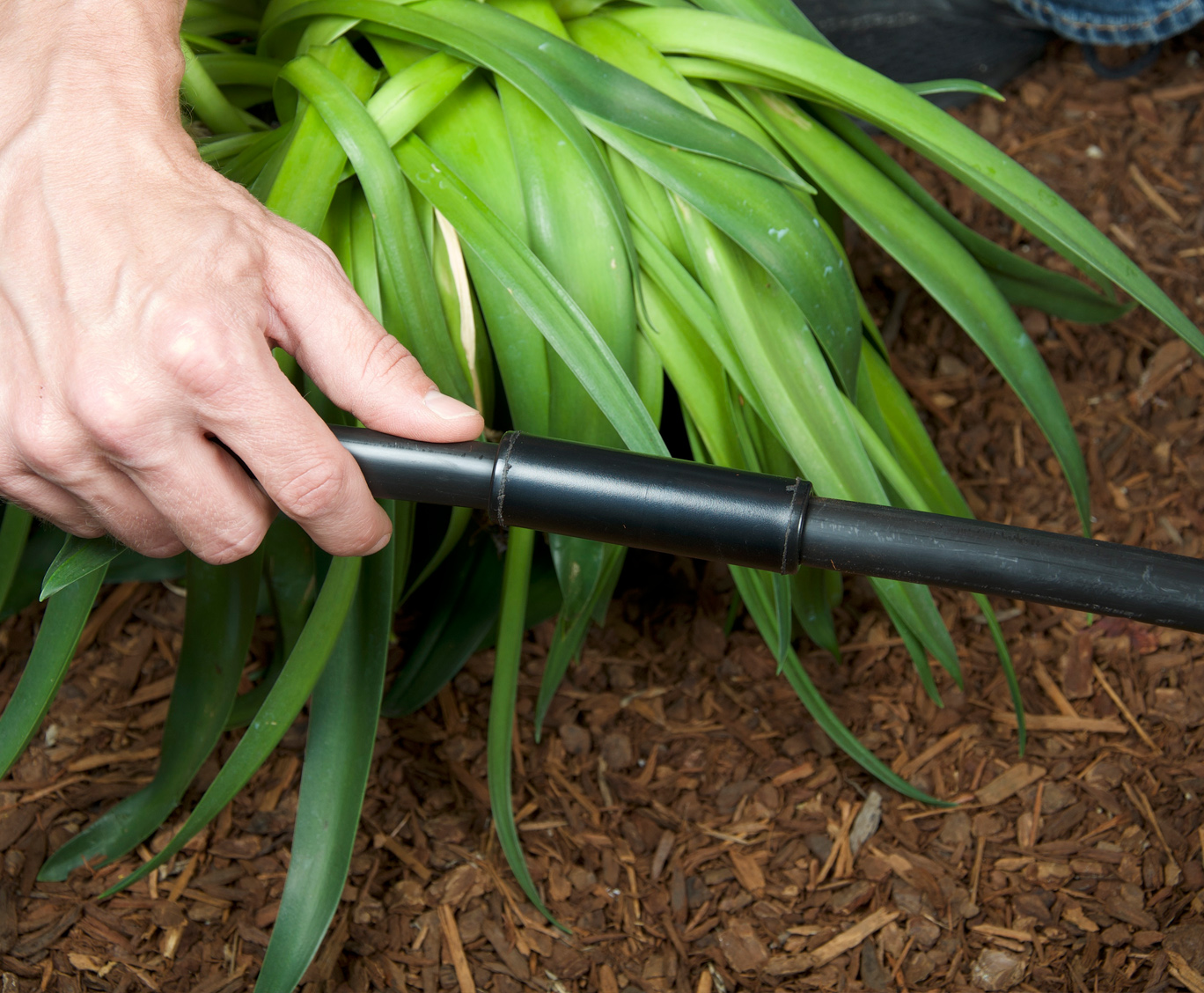
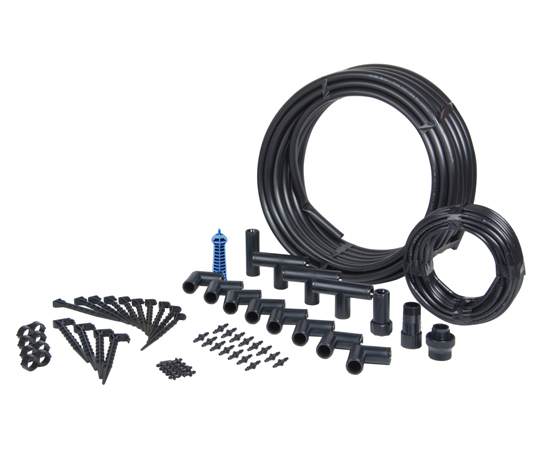
DIG ML50 Raised Bed Drip Kit is specially designed to water planter boxes or vegetable gardens planted in rows. The kit contains 50’ of 1/4” dripline with .52 GPH @ 15 PSI or .65 GPH @ 25 PSI drip emitters every 9”, providing up to five lines, with each line up to 10′ long (up to 150 sq. ft). The kit can be expanded to cover more than 700 sq. ft. using up to five kits together or expanding the kit using additional 1/2” drip tubing as the supply line, along with additional 1/4” drip line. The kit includes a 3/4″ backflow preventer, 3/4″ 25 PSI pressure regulator, 3/4″ swivel adapter, 50′ of our premium 1/2″ drip tubing with .600 ID x .700 OD and all the necessary parts to complete the installation.
Features
- Perfect for planter boxes or vegetable garden in-ground installations
- Complete kit; covers up to 150 sq ft (can be easily expanded)
- Contains 50′ of 1/4″ drip line with .52 GPH pre inserted drip emitters every 9″
- Applies water at a very low application rate leading to less surface evaporation from leaves and soil
- Offers flexibility in irrigation frequency and application rate, minimizing surface compacting and runoff
- Designed for row plantings, or plants in close spacing of any type
- No special tools or glue are needed
- Saves money by significantly lowering the cost of system components compared to conventional irrigation systems
- DIG’s drip irrigation products may be exempt from residential and commercial watering restrictions (check local codes).
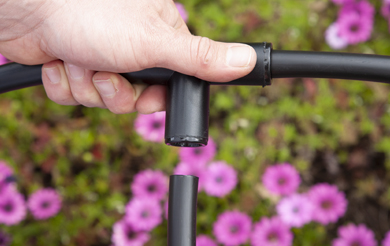
How to Order
| MODEL | DESCRIPTION |
|---|---|
| ML50 | Raised Bed Garden Drip Irrigation Kit |
Specifications
- Maximum incoming operating pressure: 100 PSI
- Recommenced operating pressure: 25 PSI (25 PSI pressure regulator included)
- Maximum recommended flow rate: 220 GPH (3.7 GPM)
- Maximum recommended distance for 9" spacing: 28' (8.5 m)
- Drip poly tubing length & size: 50' x 1/2" with .600 ID x .700 OD
- Drip line length & size: 50' x 1/4" with .170 ID x .240 OD
- 3/4" FHT x MHT pressure regulator: downstream pressure preset to 25 PSI
- PC drip emitter flow rates: .52 GPH @ 15 PSI and .65 GPH @ 25 PSI)
- Total flow rate for this kit: 36 GPH (.61 GPM)
Box Contents
| qty | description |
|---|---|
| 1 | 3/4" FHT x MHT backflow preventer |
| 1 | 3/4" FHT x MHT preset pressure regulator |
| 1 | 3/4" FHT swivel adapter |
| 1 | 50' of 1/2" poly tubing |
| 1 | 50' of 1/4" dripline with 9" drip emitter spacing |
| 1 | 1/2" coupling |
| 3 | 1/2" tees |
| 8 | 1/2" elbows |
| 4 | 1/2" tubing holder stakes |
| 10 | 1/4" tubing holder stakes |
| 15 | 1/4" barbs |
| 10 | goof plugs |
| 1 | hole punch |
| 4 | figure "8" hose ends |
| 1 | Instruction manual |
Manuals
Videos
About the ML50 Raised Bed Drip Kit
The ML50 Raised Bed Drip Kit can be used in a wide range of layouts, including planter boxes, vegetable gardens and plants in close spacings to satisfy any garden watering requirements. The Raise Bed Drip Kit uses a ¼” drip line with pre-inserted drip emitters every 9” for even uniformity along short lengths of drip line. The drip line can be used to cover vegetable plants in rows or closely spaced plants within the layout. This kit contains all the parts required to install a complete system for up to 150 SF. It can be connected into a 3/4″ faucet/spigot or a garden hose. If a faucet is not adjacent to the garden or to the location of your drip irrigation installation, you may extend from the faucet using a garden hose or use additional length of ½” drip tubing (model B35 for 50‘or B36 for 100’). To start the installation, the backflow device can be mounted directly to the faucet or to the end of a garden hose. Please make sure to add the 25 PSI pressure regulator (included) after the backflow preventer. The pressure regulator is used to lower the incoming pressure from the faucet to the recommended operating pressure of 25 PSI, which is within the range of operating pressures for drip irrigation or micro-sprinkler systems.
The instruction manual for this kit can found in the kit package.
Installation Steps
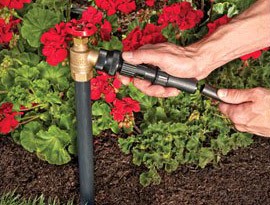 Connect the pressure regulator to the backflow preventer and attach to the faucet. Insert the 1/2″ poly tubing into the swivel adapter compression side and screw the swivel adapter into the pressure regulator.
Connect the pressure regulator to the backflow preventer and attach to the faucet. Insert the 1/2″ poly tubing into the swivel adapter compression side and screw the swivel adapter into the pressure regulator.
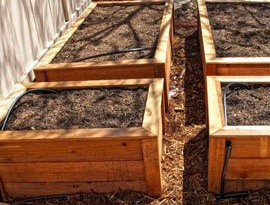 Leave the poly tubing out in the sun for a few minutes to make it easier to work with and then lay it out near the raised beds or planter boxes.
Leave the poly tubing out in the sun for a few minutes to make it easier to work with and then lay it out near the raised beds or planter boxes.
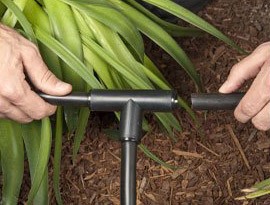 Near each raised bed, connect a 1/2″ tee. From the tee, extend poly tubing to the top of the raised bed and add a 1/2″ elbow. From the elbow, extend an additional length of drip tubing along the side of the bed.
Near each raised bed, connect a 1/2″ tee. From the tee, extend poly tubing to the top of the raised bed and add a 1/2″ elbow. From the elbow, extend an additional length of drip tubing along the side of the bed.
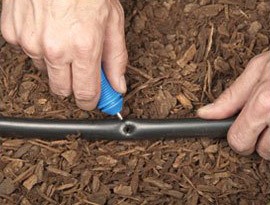 In front of each row, punch a hole into the side of the poly tubing using the hole punch.
In front of each row, punch a hole into the side of the poly tubing using the hole punch.
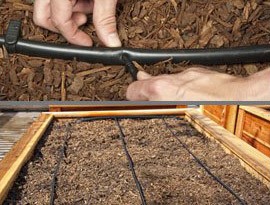 Insert a 1/4″ barb into the end of the dripline and then insert the barb into the poly tubing. Run the drip line along the length of the row, repeat for each row, and leave the drip line end open.
Insert a 1/4″ barb into the end of the dripline and then insert the barb into the poly tubing. Run the drip line along the length of the row, repeat for each row, and leave the drip line end open.
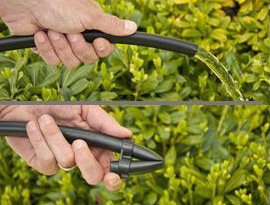 Turn the water on and flush the line, then close the end of the dripline using a goof plug and the end of the poly tubing using a figure “8” hose end.
Turn the water on and flush the line, then close the end of the dripline using a goof plug and the end of the poly tubing using a figure “8” hose end.
Example layout:
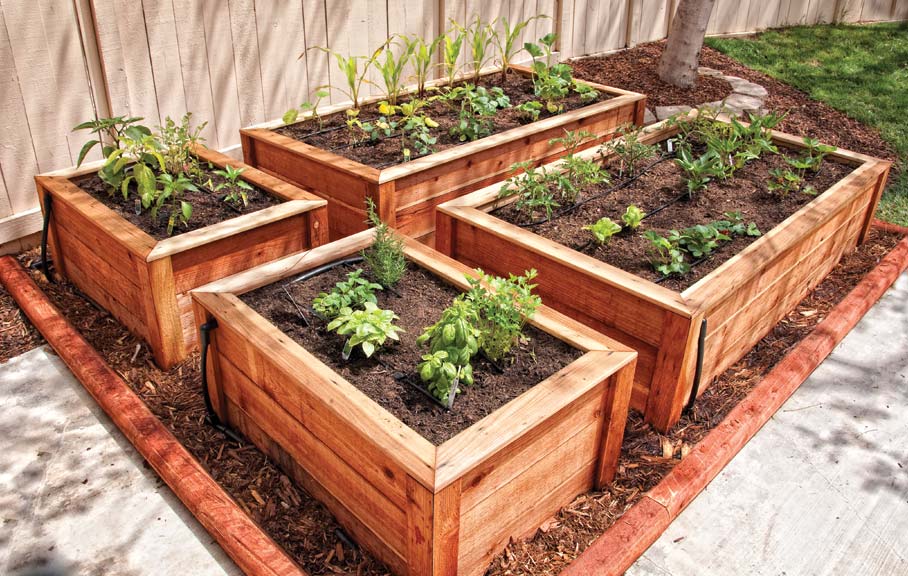
Start the kit from a faucet or garden hose
- First review the area to be irrigated and then make a drawing of the garden or site with your preferred layout.
- To automate the system, install one of DIG’s hose end timers (not included) after the backflow device.
- In the installation stage, to the faucet, first connect the backflow device, then the pressure regulator and then the 3/4″ swivel adapter with the 60 mesh screen. If water quality is a concern, we highly recommend using a fine mesh 3/4″ filter with 155 mesh (model D57A), not included with this kit.
- Lay out the 1/2″ drip tubing per your drawing and along each planter.
- Near the corner of each planter cut the 1/2” drip tubing and connect a 1/2″ tee. To the tee, connect an additional length of 1/2″ drip tubing and raise the drip tubing to the top of the planter. To install the 1/2″ compression fittings, cut the drip tubing with a hand pruner, being careful to keep dirt from entering the line. Hold the compression fitting in one hand and the drip tubing in the other and force the drip tubing into the fitting by wiggling it from side to side. Make sure that the drip tubing is pushed into the compression fitting for about 1/2″ to 5/8″ for a very tight fit. No glue or clamps are required.
- To the end of the drip tubing, connect a 1/2″ elbow and to the 1/2″ elbow, connect a short length of 1/2″ drip tubing. Lay out the 1/2” drip tubing perpendicular to the planter’s rows and to end of the planter. This is the main water supply line for each planter.
- Near each row, punch a hole into the side of the 1/2″ drip tubing and insert a 1/4″ barb.
- To the 1/4” barb, connect the 1/4” drip line with drip emitters every 9” and lay out the 1/4″ drip line beside the plant rows a few inches past the last plant in each row to compensate for temperature changes that may affect the length of the drip tubing. Do not extend the drip line beyond the recommended layout of 28′ in length
- Secure the 1/4” drip line, using the 1/4″ stakes included.
- Turn the faucet on and flush the line for a few minutes to clean all debris that may be trapped inside the drip tubing or the drip line. Then shut off the faucet and close the end of the 1/2” drip tubing using the 1/2” hose end and the 1/4” plugs included with the kit.
- Pressurize the system again and make sure that the system is working correctly and no leak appears.
Note: To expand the kit we highly recommend continuing with the same model drip line. Review the instruction manual included with the kit for complete details.
Using drip irrigation, water first thing in the morning before the temperature begins to rise. This will allow excess moisture on the leaves and top soil to dry before fungal and other diseases can develop. The most common cause of early plant death is over watering. Using drip irrigation can help sustain healthy plants by applying water directly to the plant root zone when and where it is needed. For established plantings, deep, infrequent watering is recommended. In most cases deep watering will encourage deeper rooting, which leads to stronger, healthier plants.
About the soil and suggested drip emitter spacing:
Sandy soil or light textured soil: Water percolates straight through before it can spread far enough horizontally, so use the drip emitters in close spacing of 10″ to 12″ apart. Apply water at close intervals such as every other day for 20 to 90 minutes depending on plant size and type, daylight conditions (full sun, partial sun or shaded) and weather pattern (cold to hot) with the plants under full sun in hot conditions getting the longer period.
Loamy soil or medium textured soil: This is the ideal soil condition with water moving slowly and spreading evenly, so use the drip emitters spaced 16″ to 18″ apart. Apply water at wider intervals such as every two to four days for 15 to 90 minutes depending on plant size, type, daylight conditions (full sun, partial sun or shaded) and weather pattern (cold to hot) with the plants under full sun in hot conditions getting the longer period.
Clay soil or heavy textured soil: Water is absorbed very slowly, so install the drip emitters at a spacing of 18″ to 24″ apart. Apply water at longer intervals such as every three to five days for 30 minutes to 60 minutes depending on flow rate, plant size and type, daylight conditions (full sun, partial sun or shaded) and weather pattern (cold to hot) with the plants under full sun in hot condition getting the longer period.
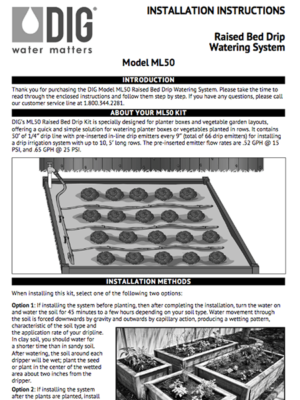
 English
English 